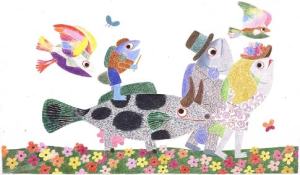
Lionni is describing the process of the minnow using his prior knowledge and incorporating the details the frog told him. Since he only knows about fish (and frogs) he adds the details of wings and legs and colors and udders onto a fish. He does not not that they were fundamentally different animals because he does not know of any different animals (except for the frog). I think we resist change because it can be uncomfortable to learn something knew. I means we have to adjust what we think, and re-evaluate some of our past decides or action.
One of the reasons my first jobs was at a middle school is because I love how honest and open the students at that age can be. I was helping out in a science class and they were dissecting muscles, specifically chicken. This wonderful student had an interesting question while cutting into a chicken breast. He asked why we called the animal with feathers and the delicious food the same thing. He whole class broke out in laughter and you could see the realization come across his face that he has been eating animals his entire life and no one told him. I don't think he had the chicken nuggets for lunch that day.
We resist change because if we can add bits and piece of information onto what we already know, it is not as uncomfortable. Changing our world view can leave us shaken a little bit.
Definitions:
Learning: the act of acquiring data about the world
Understanding: using acquired data and prior knowledge to synthesize the intended meaning

I loved your example from middle school. I currently teach middle school and I love it too. That age group is still open to new ideas and full of curiosity, all while willing to be molded into new and better learners. As adults, we need to take back a little bit of our wonderment and openness in order to become more well rounded learners, teachers, and members of society.
ReplyDeleteThat story is so sweet! Funny connection in Spanish: pez= fish that swims, pescado= fish you eat, so in some languages they are separated!
ReplyDelete